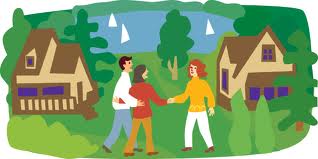
By Francesca Biller.
Last week, my daughter looked at me with her wide innocent eyes and asked, "Mommy, what does it mean to be neighborly?"
After careful consideration, I said, "It means to look out for your neighbors and the people around you." She replied, "Well, isn't that the most obvious thing in the world? They are our neighbors after all."
I explained that being neighborly extends beyond just the people who live near her, and involves being empathetic to anyone she may come across.
I realized just then how the concept of "neighborly" has changed since I was young; and while it has changed in order to keep up with a faster-paced world, it remains a value that is cherished, and in dire need.
While there is no doubt that communities across the country suffer with a stressed economy, amazingly enough, there are some positive effects, that people are just now experiencing for the first time, and in a "neighborly" way.
This includes minority groups who report feeling more accepted as they live in multicultural communities. In generations past, the segregation of most ethnic groups led to feelings of isolation. But today, many feel more support from neighbors who come from different ethnic backgrounds than their own.
Historically, during periods of financial hardship, people have formed tighter bonds out of material necessity. In the United States during the Depression, families moved in with strangers because everyone knew that they needed to help one another for communities to survive.
This is happening again today. But what has changed is that people from different ethnic backgrounds now feel a greater sense of community than most can remember as children.
This led me to reflect upon my own childhood because I never felt that I fit in with any neighborhood that I lived in. We lived in several neighborhoods where we faced racism, because we were the only multiracial family. With a Japanese mother and Russian-Jewish father, my three siblings and I learned how to deal with adversity from an early age.
Throughout my adult life, I have moved multiple times, sometimes for better jobs, better schools for my kids, or because I wanted to be closer to extended family. But as an adult, I am happy to say that I have yet to experience a neighborhood where I felt "I did not belong" simply because of my race.
As my children are an ethnic blend of Italian, Japanese-Buddhist, Russian-Jewish, Irish, Scotch, English, Welsh, Polish, and French; thankfully, they have never shared the negative experiences I did as a child because they are multiracial.
On the contrary, the first neighborhood we lived in included families from Persian, Black, Hispanic, Israeli, Korean, and Caucasian descent, but what matters most is that my children never even spoke about what race anyone was. Rather, they simply knew them as neighbors with whom they felt a connection.
The other positive "neighborly" change is through the invention of the Internet. Although people blame the Information Highway for negative blogs and websites, as well as conduits and platforms for hate speech, and bullying, the Internet has helped millions of people to connect with others for support, especially those who otherwise might continue to suffer and feel isolated.This support is colorblind, I have witnessed through my reporting and usage of social networking sites people from all ethnic and religious backgrounds from all over the world connect with one another.
There are also thousands of sites that offer support and communication for people who suffer from physical and mental illnesses, as well as resources for those who struggle with day-to-day issues like domestic abuse, financial struggles, single parenting, and virtually for anyone who is need of support.
This too, is another way of being "neighborly." The United States has finally realized we are a just one geographic part of an ever-shrinking global world and not a country unto just our own people.
We are hopefully learning that we are all just one neighbor away from everyone else, and that attempting to connect to others of every race, religion, ideology, and circumstance can only bring good in the end to us all.
This week my daughter came home from school and told me, she stood up for a younger girl on the playground because other kids were picking on her during recess because she was poor and wore the same outfit every day.
"I told him that he should pick on someone his own size," she said. "And I also told him that maybe he should spend some of his own Christmas money and buy her a new dress."
"That's it," I said to my pig-tailed little girl. "You've hit the neighborly button on the head."
Article reprinted with permission of USAonRace.com
Featured Photo Credit: muslimah.femagination.com







No Responses to “Being Neighborly Being at Home”